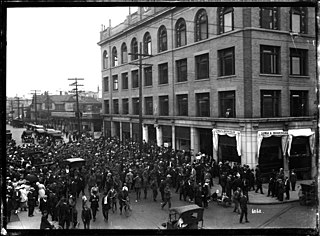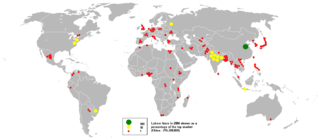Related Research Articles

The International Labour Organization (ILO) is a United Nations agency whose mandate is to advance social and economic justice through setting international labour standards. Founded in October 1919 under the League of Nations, it is the first and oldest specialised agency of the UN. The ILO has 187 member states: 186 out of 193 UN member states plus the Cook Islands. It is headquartered in Geneva, Switzerland, with around 40 field offices around the world, and employs some 3,381 staff across 107 nations, of whom 1,698 work in technical cooperation programmes and projects.
Labour laws are those that mediate the relationship between workers, employing entities, trade unions, and the government. Collective labour law relates to the tripartite relationship between employee, employer, and union. Individual labour law concerns employees' rights at work also through the contract for work. Employment standards are social norms for the minimum socially acceptable conditions under which employees or contractors are allowed to work. Government agencies enforce labour law.

United Kingdom labour law regulates the relations between workers, employers and trade unions. People at work in the UK can rely upon a minimum charter of employment rights, which are found in Acts of Parliament, Regulations, common law and equity. This includes the right to a minimum wage of £9.50 for over-23-year-olds from April 2022 under the National Minimum Wage Act 1998. The Working Time Regulations 1998 give the right to 28 days paid holidays, breaks from work, and attempt to limit long working hours. The Employment Rights Act 1996 gives the right to leave for child care, and the right to request flexible working patterns. The Pensions Act 2008 gives the right to be automatically enrolled in a basic occupational pension, whose funds must be protected according to the Pensions Act 1995.

Trade Unions in India are registered and file annual returns under the Trade Union Act (1926). Statistics on Trade Unions are collected annually by the Labour Bureau of the Ministry of Labour, Government of India. As per the latest data, released for 2012, there were 16,154 trade unions which had a combined membership of 9.18 million. The Trade Union movement in India is largely divided along political lines and follows a pre-Independence pattern of overlapping interactions between political parties and unions. The net result of this type of system is debated as it has both advantages and disadvantages. BMS is the largest trade union of India.

A strikebreaker is a person who works despite an ongoing strike. Strikebreakers are usually individuals who were not employed by the company before the trade union dispute, but rather hired after or during the strike to keep the organization running. Strikebreakers may also refer to workers who cross picket lines to work.

Canadian labour law is that body of law which regulates the rights, restrictions, and obligations of trade unions, workers, and employers in Canada.
Trade unions in South Africa has a history dating back to the 1880s. From the beginning unions could be viewed as a reflection of the racial disunity of the country, with the earliest unions being predominantly for white workers. Through the turbulent years of 1948–1991 trade unions played an important part in developing political and economic resistance, and eventually were one of the driving forces in realising the transition to an inclusive democratic government.

Labor relations is a field of study that can have different meanings depending on the context in which it is used. In an international context, it is a subfield of labor history that studies the human relations with regard to work in its broadest sense and how this connects to questions of social inequality. It explicitly encompasses unregulated, historical, and non-Western forms of labor. Here, labor relations define "for or with whom one works and under what rules. These rules determine the type of work, type and amount of remuneration, working hours, degrees of physical and psychological strain, as well as the degree of freedom and autonomy associated with the work." More specifically in a North American and strictly modern context, labor relations is the study and practice of managing unionized employment situations. In academia, labor relations is frequently a sub-area within industrial relations, though scholars from many disciplines including economics, sociology, history, law, and political science also study labor unions and labor movements. In practice, labor relations is frequently a subarea within human resource management. Courses in labor relations typically cover labor history, labor law, union organizing, bargaining, contract administration, and important contemporary topics.
Colombia is a sovereign state situated in South America. It has been a member of the United Nations since 5 November 1945, and is party to a variety of international agreements concerning human rights. It also has a series of domestic laws concerning the protection of human rights. However, Colombia's human rights record often contradicts directly with the laws and agreements to which it is bound; Colombia was referred to as the country with the "worst human rights record in the western hemisphere," by HRW in 2007. The same was said of Guatemala in 1998, as well as Cuba in 2012 and Venezuela today. In the UK Foreign Office annual human rights report for 2010, Colombia features as one of 20 "Countries of Concern".
Trade unions in Benin operate in relative freedom, with approximately 75% of the formal sector being unionized. There are, however, concerns expressed by the International Labour Organization (ILO) and the International Trade Union Confederation (ITUC) about the discrepancies between the government's Labour Code and the labour practices outlined by ILO Conventions 87 and 98 - specifically the right of unions to form without government approval, the right of seafarers to organize or strike, and restrictions on strikes.
Trade unions in Laos have been active in the country since at least the mid-20th Century.

Indian labour law refers to law regulating labour in India. Traditionally, Indian government at the federal and state levels have sought to ensure a high degree of protection for workers, but in practice, this differs due to form of government and because labour is a subject in the concurrent list of the Indian Constitution. The Minimum Wages Act 1948 requires companies to pay the minimum wage set by the government alongside limiting working weeks to 40 hours. Overtime is strongly discouraged with the premium on overtime being 100% of the total wage. The Payment of Wages Act 1936 mandates the payment of wages on time on the last working day of every month through a bank transfer or through postal services. The Factories Act 1948 and the Shops and Establishment Act 1960 mandates 15 working days of fully paid vacation leaves each year to each employee with an addition 7 fully paid sick days. The Maternity Benefit (Amendment) Act, 2017 gives female employees of every company the right to take 6 months worth of fully paid maternity leave. It also provides for 6 weeks worth of paid leaves in case of miscarriage or medical termination of pregnancy. The Employees' Provident Fund Organisation and the Employees' State Insurance, governed by statutory acts provides workers with necessary social security for retirement benefits and medical and unemployment benefits respectively. Workers entitled to be covered under the Employees' State Insurance are also entitled 90 days worth of paid medical leaves. A contract of employment can always provide for more rights than the statutory minimum set rights. The Indian parliament passed four labour codes in 2019 and 2020 sessions. These four codes will consolidate 44 existing labour laws. They are: The Industrial Relations Code 2020, The Code on Social Security 2020, The Occupational Safety, Health and Working Conditions Code, 2020 and The Code on Wages 2019.

Laval un Partneri Ltd v Svenska Byggnadsarbetareförbundet (2007) C-341/05 is an EU law case, relevant to all labour law within the European Union, which held that there is a positive right to strike. However, it also held that the right to strike must be exercised proportionately and in particular this right was subject to justification where it could infringe the right to freedom to provide services under the Treaty on the Functioning of the European Union article 56.

Demir and Baykara v Turkey [2008] ECHR 1345 is a landmark European Court of Human Rights case concerning Article 11 ECHR and the right to engage in collective bargaining. It affirmed the fundamental right of workers to engage in collective bargaining and take collective action to achieve that end.

Wilson v United Kingdom [2002] ECHR 552 is a UK labour law and European labour law case concerning discrimination by employers against their workers who join and take action through trade unions. After a long series of appeals through the UK court system, the European Court of Human Rights held that ECHR article 11 protects the fundamental right of people to join a trade union, engage in union related activities and take action as a last resort to protect their interests.
South African labour law regulates the relationship between employers, employees and trade unions in the Republic of South Africa.
International labour law is the body of rules spanning public and private international law which concern the rights and duties of employees, employers, trade unions and governments in regulating the workplace. The International Labour Organization and the World Trade Organization have been the main international bodies involved in reforming labour markets. The International Monetary Fund and the World Bank have indirectly driven changes in labour policy by demanding structural adjustment conditions for receiving loans or grants. Issues regarding Conflict of laws arise, determined by national courts, when people work in more than one country, and supra-national bodies, particularly in the law of the European Union, has a growing body of rules regarding labour rights.
National Union of Rail, Maritime and Transport Workers v United Kingdom [2014] ECHR 366 is a UK labour law case, concerning collective action and the right to take secondary action under ECHR article 11. It held that UK restrictions cannot be questioned on human rights grounds.
Enerji Yapi-Yol Sen v Turkey [2009] ECHR 2251 is a European labour law case, relevant for UK labour law concerning the right to strike.

Nepal has a labour force of 16.8-million-workers, the 37th largest in the world as of 2017. Although agriculture makes up only about 28 per cent of Nepal's GDP, it employs more than two-thirds of the workforce. Millions of men work as unskilled labourers in foreign countries, leaving the household, agriculture, and raising of children to women alone. Most of the working-age women are employed in agricultural sector, contributions to which are usually ignored or undervalued in official statistics. Few women who are employed in the formal sectors face discrimination and significant wage gap. Almost half of all children are economically active, half of which are child labourers. Millions of people, men, women and children of both sexes, are employed as bonded labourers, in slavery-like conditions. Trade unions have played a significant role in earning better working conditions and workers' rights, both at the company level and the national government level. Worker-friendly labour laws, endorsed by the labour unions as well as business owners, provide a framework for better working conditions and secure future for the employees, but their implementation is severely lacking in practice. Among the highly educated, there is a significant brain-drain, posing a significant hurdle in fulfilling the demand for skilled workforce in the country.
References
- ↑ "Maldives formally accepts the ILO obligations" Miadhu News, 4 December 2008 "Maldives formally accepts the ILO obligations". Archived from the original on 2008-12-04. Retrieved 2009-02-04.